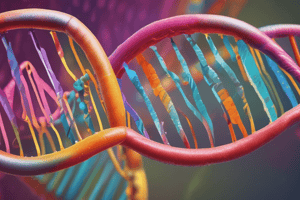Podcast
Questions and Answers
What is genetic variation primarily the result of?
What is genetic variation primarily the result of?
- Mutations and recombination (correct)
- Rapid population growth
- Environmental factors
- Asexual reproduction
What term describes different forms of the same gene?
What term describes different forms of the same gene?
- Phenotypes
- Chromosomes
- Alleles (correct)
- Gametes
What is NOT true about mutations?
What is NOT true about mutations?
- They can arise from exposure to mutagens
- They create diversity among organisms
- They can be beneficial for survival
- They are always harmful (correct)
Which of the following statements about chromosomes is accurate?
Which of the following statements about chromosomes is accurate?
Which of the following is a role of genes in an organism?
Which of the following is a role of genes in an organism?
How does genetic variation contribute to evolution?
How does genetic variation contribute to evolution?
What is the outcome of alleles that are codominant?
What is the outcome of alleles that are codominant?
What is the typical chromosome configuration in humans?
What is the typical chromosome configuration in humans?
Flashcards
What is Biology?
What is Biology?
The study of all living things including their structure, function, growth, evolution, and distribution. It's a vast field covering many topics.
What is Genetic Variation?
What is Genetic Variation?
Differences in DNA sequences between individuals within a population. Variations arise from mutations, recombination, and gene flow.
What are Alleles?
What are Alleles?
Different forms or versions of a specific gene. They lead to variations in traits.
What are Genes?
What are Genes?
Signup and view all the flashcards
What are Mutations?
What are Mutations?
Signup and view all the flashcards
What are Chromosomes?
What are Chromosomes?
Signup and view all the flashcards
What is Gene Expression?
What is Gene Expression?
Signup and view all the flashcards
What is Heredity?
What is Heredity?
Signup and view all the flashcards
Study Notes
Introduction to Biology
- Biology is the scientific study of all living organisms, encompassing their structure, function, growth, origin, evolution, and distribution. It encompasses a vast array of topics.
Genetic Variation
- Genetic variation is the difference in DNA sequences among individuals within a population.
- This variation arises from mutations, recombination during meiosis, and gene flow.
- It plays a crucial role in adaptation and evolution, as it provides the raw material for natural selection to act upon.
- Genetic variation is essential for a species' ability to adapt to changing environments.
Alleles
- Alleles are different forms or versions of a particular gene.
- A gene is a segment of DNA that contains the instructions for building a particular protein.
- Different alleles of the same gene might lead to variations in the traits expressed by an organism.
- For example, the gene for eye color has alleles that code for different pigment levels, leading to variations in eye color.
- Alleles may be dominant or recessive, determining how they are expressed in the phenotype.
Genes
- Genes are the fundamental units of heredity.
- They are segments of DNA that contain the code for proteins, which carry out the functions within a living organism.
- Genes influence all aspects of an organism's life cycle, from physical characteristics to susceptibility to disease.
- Gene expression is the process by which the information encoded in a gene is used to create a functional product, usually a protein.
Mutations
- Mutations are permanent changes in the DNA sequence of an organism.
- They can arise from mistakes during DNA replication, exposure to mutagens like radiation or chemicals, or from errors in DNA repair mechanisms.
- Mutations are crucial for evolutionary change, contributing to the diversity of life.
- Some mutations are harmful, others are neutral, and some can be beneficial, if they improve the ability of an organism to survive and reproduce in its environment.
Chromosomes
- Chromosomes are thread-like structures located within the nucleus of a cell.
- They are composed primarily of DNA and proteins.
- Chromosomes carry the genes, the units of heredity.
- Different species have different numbers of chromosomes.
- Humans have 23 pairs of chromosomes (46 in total), consisting of one set inherited from each parent.
Studying That Suits You
Use AI to generate personalized quizzes and flashcards to suit your learning preferences.
Description
Explore the fundamentals of genetic variation in biology. This quiz covers key concepts such as alleles, the importance of genetic differences in populations, and their role in evolution and adaptation. Test your understanding of how these principles shape the diversity of life.




